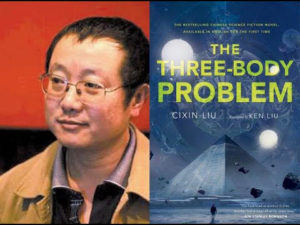In August 2015, something previously unthinkable happened: a translation of a popular Chinese novel won one of the most prestigious awards in world science fiction. By taking home the Hugo at the Seventy-Third WorldCon, Ken Liu’s translation of Liu Cixin’s 刘慈欣 The Three-Body Problem 三体 (Tor Books, 2014) demonstrated that popular Chinese literature was finally reaching an audience outside of China.
Liu Cixin is often called one of the ‘three generals’ of Chinese sci fi (the other two are Wang Jinkang 王晋康, known for his think pieces, and the famously acerbic Han Song 韩松). Liu is perhaps the most beloved writer of speculative fiction writing in China today, often compared to authors of ‘hard’ science fiction such as Isaac Asimov and Arthur C Clarke. An engineer by day, aside from his ambitious, award-winning trilogy, Liu Cixin has penned a number of short stories and novellas that grapple with the thorny ontology of human civilisation in the face of political and social collapse. Shortly after the Hugo announcement, the second volume of The Three-Body Problem, titled The Dark Forest 黑暗森林. was released by Tor Books.
In September 2015, Liu Cixin and a group of sci fi writers met with Chinese Vice-President Li Yuanchao 李源潮, with Li urging the writers to use their work to promote the cause of ‘national revival’ and inspire interest in science among the youth.
Although some individuals have cautioned readers against overly simplistic interpretations of Chinese science fiction as criticism of the Chinese government, given the state of the natural
environment and limitations on freedom of speech, it is hard not to see social criticism in works such as Chen Qiufan’s 陈楸帆 The Smog Society 霾 and Ma Bo
yong’s 马伯庸 The City of Silence 寂静之城. Liu’s The Three-Body Problem itself starts with a gruesome scene from the Cultural Revolution, which ultimately provides the premise of the trilogy’s story. For his part, Ken Liu (also the co-translator with Carmen Yiling Yan of the first story, and translator of the latter story) argued in an essay from late 2014 that given the impressive diversity of Chinese fiction we might instead see such works as an expression of global humanism rather than domestic satire.



